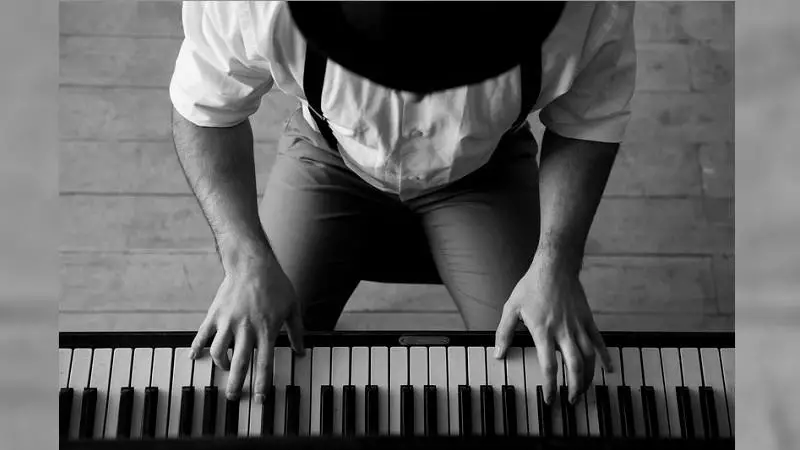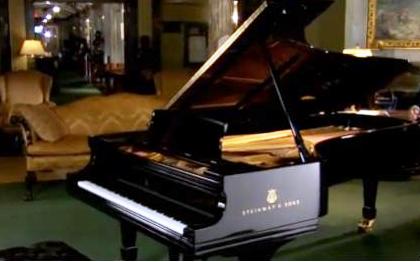
Here are the fundamentals of piano practice that will keep you going and help you to learn new songs quite fast.
Want to become better at playing the piano (or any other musical instrument)? The only way is to practice, and that is where most beginners falter, be it children or adults. Most students practice the first few weeks, because of the initial excitement, but that excitement soon begins to wear off, which then impacts the practice sessions.
Why You Must Practice Playing the Piano
There is a saying that “If you do not practice for one day, you will know it. If you do not practice for two days, your family members will know it and if you do not practice for three days, the audience will know it”.
How much piano practice you need depends on various factors.
Are you aiming to be one of the top players, are you learning on your own without the help of a teacher or are you doing it for fun?
“It’s kind of a slog, especially to practice a new piece: something written specifically for me, something that I’ve never heard before. You get the music, and you try to learn it note by note,” says Grammy-winning pianist Emanuel Ax (at age 69, practices piano four hours a day).
Practicing the piano means:
- You sit on the piano and go through a set of lessons & exercises, all by yourself
- It involves a specific goal.
- A lot of repetition is required to build specific muscles for playing the piano, as well as to built muscle memory.
- Most importantly, you have to do this everyday.
Looks like a chore? It may seem so, but that’s the only way to become better at things.
Practicing is about developing Muscle memory, which involves consolidating a specific motor task into memory through repetition.
It applies to other activities as well such as swimming, gymnastics, riding a bicycle, typing on a keyboard, and so on… all these involve muscle memory.
Here’s How to Practice More Efficiently
It is how you think about learning to play the piano that will make you want to practice on your own. For that, you also should have a clear understanding of the advantages and benefits of learning to play the piano.
If you believe in all that, and if you yourself feel a natural affinity for the piano, then this website will provide you with all the information you need to get started on the piano, and to provide effective piano practicing techniques.
Also Read: All time Bestselling Piano Books
Though regular practice is a must when you are learning to play the piano, there is a certain approach that one must take in order to learn new things effectively.
This is where the fundamentals of piano practice comes into picture and the best part about this is that it applies to other musical instruments as well.
As with learning anything, the more you put in the better you become!
Here are some piano practice tips & suggestions.
Listen More (to Great Performances)
Learning a classical piece? Make sure you hear expert performers play it. You will be able to appreciate the various nuances of the piece, something you may not pick up playing from the sheet.
Besides, it becomes easier to play music from sheet, if you have heard the piece before.
So, spend more time on YouTube, and checkout the options available on services like Spotify to listen to great performances.
Practice With a Partner
Want to make your practice session fun, get a partner, with whom you can practice.
You can play things faster, slower, or may be you can play the left hand and your partner the right (and vice-versa). You can exchange ideas, and learn more about music.
If possible, practice or play with partners who play different musical instruments; it will be fun and a more enriching experience for you. You will learn how to support one another, and also the other player’s interpretation of the musical work.
If you’re learning a new piece, may be you can partner with your teacher and play the entire piece once, so that you know how it sounds (which makes it easier to practice on your own later on).
No Time to Practice, Not Even 15 to 20 minutes?
This is a genuine concern for a lot of people, especially if you are working. There would already be so many things in your to-do list that finding time for anything else may be difficult.
Fortunately for you, as a beginner piano player, all you would need to spare would be around 15 minutes. Yes, 15 to 20 minutes of daily piano practice is what you need to start with.
With a little time management, that should be easy but the difficult part will be to practice consistently.
You will need to practice regularly if you want to become good at the piano. With your hectic schedule, practicing regularly could get a bit challenging. This is where you need patience, dedication and a bit of planning.
Also Read: Best Piano Learning software
Practice at the Same Time Everyday
It is important that you schedule your piano practice session at the same time every day.
Choose a time which you can stick to regularly and when you are not likely to be disturbed easily. You will have to do some trial and error to find out what time suits you best.
Students can have there keyboard practice session when they get back home from school.
Choose a time which does not collide with their play time or which is not very close to their play time. They will be eager to get through their piano lessons quickly and so will not be able to concentrate well.
Focus on Quality vs. Quantity
The quality, the standard, the way you practice is a lot more crucial compared to the amount of time you put in.
The old saying that “practice makes perfect” applies today as well. But then for it to be the most effective the practice part itself needs to be perfect.
If you do it wrong you won’t receive much benefit from it.
Wear Your Thinking Hat While Practicing
It is very important that you think about what are you practicing or playing; and how it applies to the bigger picture.
For example, if you are practicing a scale or practicing some finger exercises if you pay attention to what is being played, from time to time you will bump into phrases that will sound exactly like some phrase / section of a popular song.
Yes, it Will, if you pay attention you will notice that. This is what I mean by thinking and playing.
And this will also help you to develop your ears, which in turn will help you to play most songs by ear. But then the first step is to think and learn!
Look for Mistakes & Avoid Them
Lot of beginner piano students and even experienced players pick up bad habits by mistake, and even after being pointed out, for some reason they just like doing it.
One example would be when you are practicing music scales, all of a sudden you will stop doing that and start improvising, or maybe use a wrong finger, or maybe use a wrong note altogether. And for some reason you will continue doing that.
This is more of a discipline issue, and the sooner you get rid of it, the better you will be able to use your time.
Also Read: Concert Tips from experienced piano teacher.
Set Important Goals in Piano Practice
Piano practice without having some goals to achieve will not give you the desired results. It will still help but having some goals to achieve means you’ll see better accomplishments in the long run.
If you have an excellent piano teacher, then the goals would be set by the teacher every week. If you or your child’s teacher does not set a goal, discuss with your teacher about goals.
Remember, just because your teacher plays the piano well doesn’t mean he/she will be a good teacher as well. If another teacher is not an option for you, then you have to help the teacher help you learn better.
If you are not getting goals set by your teacher, do the following:
1. Ask your teacher: What should you be trying to learn by next week?
(Try to get it down to as specific as possible, for eg.
a. no wrong notes for this piece
b. Play with the metronome at this speed five times a day (for rhythm and tempo)
c. Play the first half of the piece with the right hand only (with no wrong notes, of course!)2. If its for your child, try attending one of the classes with the teacher so you know what the teacher is trying to teach your child. Then set the goals yourself, if your teacher is unable to do so.
3. Are you preparing for a recital or for some piano exam six months down the line. If yes, how and what you should be practicing in the coming weeks leading to the event.
4. Create the right environment for practicing:
Set up a schedule for when to practice. Depending on your level, you may practice:
a. 3 or 4 times a week, or everyday;
b. 30 minute – 1 hour per session;
c. at specific time of the day (when you’re not tired).Treat this time as special, with No interruptions.
5. Make it comfortable for yourself to practice, and use a good piano bench with good cushioning.
Find Time to Practice (Those Working Full Time)
If you are working, practicing after coming back from work may not be a great idea. You will be tired and besides, you will have to spend some time with your family members.
The ideal time for you to practice would be early in the morning. Yes, you will have to push yourself to get up early (only about 15 minutes) but it is the best time to practice if you work full time.
Though a teacher is highly recommended, for some reason if you want to learn on your own, method books would be an excellent resource. A method book basically teaches you how to learn from scratch. It may come in a series of books – from beginners to advanced levels.
Most of the books nowadays come with a CD. All the songs and exercises mentioned in the book are recorded for your listening purpose. It is easier to play something if you know the melody and then look at the written notes.
Revisit the Old Pieces
Once you know a few pieces, you practice session should include time to revisit the old pieces as well, besides finger exercises and learning new pieces. Maybe you can practice two contrasting pieces, or something easy to balance with something hard.
Experienced performers practice the old familiar pieces before a performance, which gives them an opportunity to polish it further.
How Long Does it Take to Learn?
How long does it take to learn the piano? This is an important question for a lot of people as depending on the answer they may or may not take the plunge.
But as mentioned earlier in the piano practice tips, fifteen to twenty minutes a day is all you need to get started. If you are regular, in a matter of 6 months to a year you should be able to play basic piano well.
Of course, you may even learn earlier depending on your natural ability and how much you practice.
Intermediate level? – If you want to become a better player, expect to put around 3 to 5 years.
Yes, you will need some time to develop into a better player. You will need time to develop your left hand skills, sight reading skills, and you should be able to play in different styles of music.
But wait, after the first year it becomes easier and piano lessons do not seem to be much of a chore.
Yes, it is because by this time you will start enjoying playing the piano and your confidence will also be on a high. So, no problems for a couple of years!
Play in a Group! – The only way to learn and become better is to play as much as possible. You can play on your own, with somebody as a duet, with your friends or in a band.
Also look out for opportunities to watch other people play. To form a band find friends who can play drums, guitar and sing. Once you form a band, meet a few times in a week and practice regularly. Playing in a band is fun as well as good learning. It can turn rewarding as well if you all become good at it.
As you all improve, invite your friends to hear your band play. Take suggestions, play their favorite songs. With a little planning you can get gigs at bars, restaurant, hotels, and clubs. Hmmm, this is already sounding so interesting 🙂
Piano Student Hits 1,000 days of Practice (2.7 years)
Now here’s some inspiration for all music students out there.
A 10 year old piano student completed 1,000 days of piano practice, after a 100-day challenge by his piano instructor turned into 10 consecutive challenges (lasting 2.75 years).
Matthew deGoey, 10, decided to practice double sessions to make up for the missed days (when his family went on vacation, and he could not take his piano along).
The rule for the 100-Day Practice Challenge that music teacher and composer Henry Flurry initially set before his students was simple: “practice every day for 100 days in a row”.
However, he Henry decided to revise the rule when one student arrived in tears having missed a day due to illness. Flurry revised his rules to include, “If you miss a day, you can make it up by doing two complete practices as assigned within the same day, each practice at least an hour apart.”
So when Matthew completed his goal recently, Flurry surprised him with a cake with a large “1,000” across the top.
Matthew and his three younger siblings all take music lessons — Matthew also takes violin — Jonathan plays piano and started Suzuki cello, and the twins, Liam and Ethan are taking piano and cello, respectively.
“No, I have no musical background which is why Matthew is taking piano. I really miss that. I am so envious of that ability — to tap out a melody,” said his mother, Marguerite Kirk.
How does one schedule practice time for four children on three different instruments – piano, violin, cello?
The mother says “Keep it consistent”. Matthew practices violin in a back bedroom and then piano in the morning, Jonathan on piano in the afternoon, followed by Liam. Ethan and Jonathan practice cello together in the morning.
The 100-Day Challenge tends to create a stronger practice routine and diminish conflict at home, Flurry said, adding that he sees an increase in growth, motivation and enthusiasm. “Students are more confident in their performance, and they arrive at lessons even more eager to demonstrate their week’s accomplishments.”
Achieving 1,000 days means Matthew has practiced daily almost one-quarter of his life, 2.7 years.
To sum it up, regular practice is a must when you are learning any music instrument, but there is always a better approach to make it more effective.
KeytarHQ editorial team includes musicians who write and review products for pianists, keyboardists, guitarists & other musicians. KeytarHQ is the best online resource for information on keyboards, pianos, synths, keytars, guitars and music gear for musicians of all abilities, ages and interests.




Leave a Reply